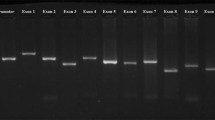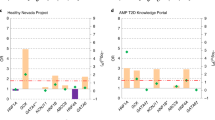Abstract
Maturity-onset diabetes of the young (MODY) is a form of monogenic diabetes caused by the variants in MODY-related genes. In addition to coding variants, variants in the promoter region of MODY-related genes can cause the disease as well. In this study, we screened the promoter regions of the most common MODY-related genes GCK, HNF1A, HNF4A and HNF1B in our cohort of 29 MODY patients. We identified one genetic variant in the HNF1A gene, a 7 bp insertion c.-154-160insTGGGGGT, and three variants in the GCK gene, −282C>T; −194A>G; 402C>G appearing as set. Chloramphenicol acetyltransferase (CAT) assay was performed to test the effect of the 7 bp insertion and the variant set on the activity of the reporter gene in HepG2 and RIN-5F cell, respectively, where a decreasing trend was observed for both variants. In silico analysis and electrophoretic mobility shift assay showed that the 7 bp insertion did not create the binding site for new transcriptional factors, but gave rise to additional binding sites for the existing ones. Results from our study indicated that the 7 bp insertion in the HNF1A gene could be associated with the patient’s diabetes. As for the GCK variant set, it is probably not associated with diabetes in patients, but it may modify the fasting glucose level by causing small elevation in variant set carriers. We have presented two promoter variants in MODY-related genes. Variant in the HNF1A gene is presumed to be disease-causing and the GCK promoter variant set could be a phenotype modifier.




Similar content being viewed by others
References
Henzen C (2012) Monogenic diabetes mellitus due to defects in insulin secretion. Swiss Med Wkly 142:w13690. https://doi.org/10.4414/smw.2012.13690
Urakami T (2019) Maturity-onset diabetes of the young (MODY): current perspectives on diagnosis and treatment. Diabetes Metab Syndr Obes 12:1047–1056. https://doi.org/10.2147/dmso.s179793
Firdous P, Nissar K, Ali S, Ganai BA, Shabir U, Hassan T, Masoodi SR (2018) Genetic testing of maturity-onset diabetes of the young current status and future perspectives. Front Endocrinol (Lausanne) 9:253. https://doi.org/10.3389/fendo.2018.00253
Lachance CH (2016) Practical aspects of monogenic diabetes: a clinical point of view. Can J Diabetes 40(5):368–375. https://doi.org/10.1016/j.jcjd.2015.11.004
Nyunt O, Wu JY, McGown IN, Harris M, Huynh T, Leong GM, Cowley DM, Cotterill AM (2009) Investigating maturity onset diabetes of the young. Clin Biochem Rev 30(2):67–74
Naylor R, Philipson LH (2011) Who should have genetic testing for maturity-onset diabetes of the young? Clin Endocrinol (Oxf) 75(4):422–426. https://doi.org/10.1111/j.1365-2265.2011.04049.x
Osbak KK, Colclough K, Saint-Martin C, Beer NL, Bellanne-Chantelot C, Ellard S, Gloyn AL (2009) Update on mutations in glucokinase (GCK), which cause maturity-onset diabetes of the young, permanent neonatal diabetes, and hyperinsulinemic hypoglycemia. Hum Mutat 30(11):1512–1526. https://doi.org/10.1002/humu.21110
Colclough K, Bellanne-Chantelot C, Saint-Martin C, Flanagan SE, Ellard S (2013) Mutations in the genes encoding the transcription factors hepatocyte nuclear factor 1 alpha and 4 alpha in maturity-onset diabetes of the young and hyperinsulinemic hypoglycemia. Hum Mutat 34(5):669–685. https://doi.org/10.1002/humu.22279
Haliyur R, Tong X, Sanyoura M, Shrestha S, Lindner J, Saunders DC, Aramandla R, Poffenberger G, Redick SD, Bottino R, Prasad N, Levy SE, Blind RD, Harlan DM, Philipson LH, Stein RW, Brissova M, Powers AC (2019) Human islets expressing HNF1A variant have defective beta cell transcriptional regulatory networks. J Clin Invest 129(1):246–251. https://doi.org/10.1172/jci121994
Harries LW, Ellard S, Stride A, Morgan NG, Hattersley AT (2006) Isomers of the TCF1 gene encoding hepatocyte nuclear factor-1 alpha show differential expression in the pancreas and define the relationship between mutation position and clinical phenotype in monogenic diabetes. Hum Mol Genet 15(14):2216–2224. https://doi.org/10.1093/hmg/ddl147
Valentinova L, Beer NL, Stanik J, Tribble ND, van de Bunt M, Huckova M, Barrett A, Klimes I, Gasperikova D, Gloyn AL (2012) Identification and functional characterisation of novel glucokinase mutations causing maturity-onset diabetes of the young in Slovakia. PLoS ONE 7(4):e34541. https://doi.org/10.1371/journal.pone.0034541
Gloyn AL (2003) Glucokinase (GCK) mutations in hyper- and hypoglycemia: maturity-onset diabetes of the young, permanent neonatal diabetes, and hyperinsulinemia of infancy. Hum Mutat 22(5):353–362. https://doi.org/10.1002/humu.10277
Valkovicova T, Skopkova M, Stanik J, Gasperikova D (2019) Novel insights into genetics and clinics of the HNF1A-MODY. Endocr Regul 53(2):110–134. https://doi.org/10.2478/enr-2019-0013
Galán M, García-Herrero CM, Azriel S, Gargallo M, Durán M, Gorgojo JJ, Andía VM, Navas MA (2011) Differential effects of HNF-1α mutations associated with familial young-onset diabetes on target gene regulation. Mol Med 17(3–4):256–265. https://doi.org/10.2119/molmed.2010.00097
Godart F, Bellanne-Chantelot C, Clauin S, Gragnoli C, Abderrahmani A, Blanche H, Boutin P, Chevre JC, Froguel P, Bailleul B (2000) Identification of seven novel nucleotide variants in the hepatocyte nuclear factor-1alpha (TCF1) promoter region in MODY patients. Hum Mutat 15(2):173–180. https://doi.org/10.1002/(sici)1098-1004(200002)15:2<173:aid-humu6>3.0.co;2-w
Radha V, Ek J, Anuradha S, Hansen T, Pedersen O, Mohan V (2009) Identification of novel variants in the hepatocyte nuclear factor-1α gene in south Indian patients with maturity onset diabetes of young. J Clin Endocrinol Metab 94(6):1959–1965. https://doi.org/10.1210/jc.2008-2371
Wirsing A, Johnstone KA, Harries LW, Ellard S, Ryffel GU, Stanik J, Gasperikova D, Klimes I, Murphy R (2010) Novel monogenic diabetes mutations in the P2 promoter of the HNF4A gene are associated with impaired function in vitro. Diabet Med 27(6):631–635. https://doi.org/10.1111/j.1464-5491.2010.03003.x
Gasperikova D, Tribble ND, Stanik J, Huckova M, Misovicova N, van de Bunt M, Valentinova L, Barrow BA, Barak L, Dobransky R, Bereczkova E, Michalek J, Wicks K, Colclough K, Knight JC, Ellard S, Klimes I, Gloyn AL (2009) Identification of a novel beta-cell glucokinase (GCK) promoter mutation (−71G>C) that modulates GCK gene expression through loss of allele-specific Sp1 binding causing mild fasting hyperglycemia in humans. Diabetes 58(8):1929–1935. https://doi.org/10.2337/db09-0070
Yoshiuchi I, Yamagata K, Yang Q, Iwahashi H, Okita K, Yamamoto K, Oue T, Imagawa A, Hamaguchi T, Yamasaki T, Horikawa Y, Satoh T, Nakajima H, Miyazaki J, Higashiyama S, Miyagawa J, Namba M, Hanafusa T, Matsuzawa Y (1999) Three new mutations in the hepatocyte nuclear factor-1alpha gene in Japanese subjects with diabetes mellitus: clinical features and functional characterization. Diabetologia 42(5):621–626. https://doi.org/10.1007/s001250051204
Gragnoli C, Lindner T, Cockburn BN, Kaisaki PJ, Gragnoli F, Marozzi G, Bell GI (1997) Maturity-onset diabetes of the young due to a mutation in the hepatocyte nuclear factor-4 alpha binding site in the promoter of the hepatocyte nuclear factor-1 alpha gene. Diabetes 46(10):1648–1651. https://doi.org/10.2337/diacare.46.10.1648
Rissanen J, Saarinen L, Heikkinen S, Kekalainen P, Mykkanen L, Kuusisto J, Deeb SS, Laakso M (1998) Glucokinase gene islet promoter region variant (G→A) at nucleotide -30 is not associated with reduced insulin secretion in Finns. Diabetes Care 21(7):1194–1197. https://doi.org/10.2337/diacare.21.7.1194
Komazec J, Zdravkovic V, Sajic S, Jesic M, Andjelkovic M, Pavlovic S, Ugrin M (2019) The importance of combined NGS and MLPA genetic tests for differential diagnosis of maturity onset diabetes of the young. Endokrynol Pol 70(1):28–36. https://doi.org/10.5603/EP.a2018.0064
Zukic B, Radmilovic M, Stojiljkovic M, Tosic N, Pourfarzad F, Dokmanovic L, Janic D, Colovic N, Philipsen S, Patrinos GP, Pavlovic S (2010) Functional analysis of the role of the TPMT gene promoter VNTR polymorphism in TPMT gene transcription. Pharmacogenomics 11(4):547–557. https://doi.org/10.2217/pgs.10.7
Lopez-Garrido MP, Herranz-Antolin S, Alija-Merillas MJ, Giralt P, Escribano J (2013) Co-inheritance of HNF1a and GCK mutations in a family with maturity-onset diabetes of the young (MODY): implications for genetic testing. Clin Endocrinol (Oxf) 79(3):342–347. https://doi.org/10.1111/cen.12050
Bennett JT, Vasta V, Zhang M, Narayanan J, Gerrits P, Hahn SH (2015) Molecular genetic testing of patients with monogenic diabetes and hyperinsulinism. Mol Genet Metab 114(3):451–458. https://doi.org/10.1016/j.ymgme.2014.12.304
Awa WL, Thon A, Raile K, Grulich-Henn J, Meissner T, Schober E, Holl RW (2011) Genetic and clinical characteristics of patients with HNF1A gene variations from the German-Austrian DPV database. Eur J Endocrinol 164(4):513–520. https://doi.org/10.1530/eje-10-0842
Kagami-Takasugi M, Katsumata N, Tanaka T, Tajima T, Fujieda K (2006) Molecular genetic analysis of MODY candidate genes in Japanese patients with non-obese juvenile onset diabetes mellitus. J Pediatr Endocrinol Metab 19(2):143–148. https://doi.org/10.1515/jpem.2006.19.2.143
Fang Q, Chen S, Wang Y, Jiang S, Zhang R, Hu C, Wang C, Liu F, Xiang K, Jia W (2012) Functional analyses of the mutation nt-128 T→G in the hepatocyte nuclear factor-1alpha promoter region in Chinese diabetes pedigrees. Diabet Med 29(11):1456–1464. https://doi.org/10.1111/j.1464-5491.2012.03626.x
Vaxillaire M, Abderrahmani A, Boutin P, Bailleul B, Froguel P, Yaniv M, Pontoglio M (1999) Anatomy of a homeoprotein revealed by the analysis of human MODY3 mutations. J Biol Chem 274(50):35639–35646. https://doi.org/10.1074/jbc.274.50.35639
Chatterjee S, Pal JK (2009) Role of 5'- and 3'-untranslated regions of mRNAs in human diseases. Biol Cell 101(5):251–262. https://doi.org/10.1042/bc20080104
Rose CS, Ek J, Urhammer SA, Glumer C, Borch-Johnsen K, Jorgensen T, Pedersen O, Hansen T (2005) A -30G>A polymorphism of the beta-cell-specific glucokinase promoter associates with hyperglycemia in the general population of whites. Diabetes 54(10):3026–3031. https://doi.org/10.2337/diabetes.54.10.3026
Vaxillaire M, Veslot J, Dina C, Proenca C, Cauchi S, Charpentier G, Tichet J, Fumeron F, Marre M, Meyre D, Balkau B, Froguel P (2008) Impact of common type 2 diabetes risk polymorphisms in the DESIR prospective study. Diabetes 57(1):244–254. https://doi.org/10.2337/db07-0615
Weedon MN, Frayling TM, Shields B, Knight B, Turner T, Metcalf BS, Voss L, Wilkin TJ, McCarthy A, Ben-Shlomo Y, Davey Smith G, Ring S, Jones R, Golding J, Byberg L, Mann V, Axelsson T, Syvanen AC, Leon D, Hattersley AT (2005) Genetic regulation of birth weight and fasting glucose by a common polymorphism in the islet cell promoter of the glucokinase gene. Diabetes 54(2):576–581. https://doi.org/10.2337/diabetes.54.2.576
Funding
This work was supported by Ministry of Education, Science and Technological Development Republic of Serbia, EB: 451-03-68/2020-14/200042.
Author information
Authors and Affiliations
Contributions
J.K. performed research and analyzed data; wrote the manuscript. M.U. designed the study and supervised the research; wrote the manuscript. B.R. and B.Z. performed research and analyzed data. V.Z. provided clinical data analysis. S.P. design and supervised the study, provided critical revision of the manuscript. All authors read and approved the final manuscript.
Corresponding author
Ethics declarations
Conflict of interest
The authors have nothing to declare.
Ethical approval
The study was approved by the Ethics Committee of the University Children’s Hospital, Belgrade (Approval Number 017/6-26/77) and was performed in accordance with the ethical standards of the Declaration of Helsinki.
Informed consent
Informed consent was obtained from all the participants that were old enough to give their own consent, and from the parents/legally authorized representatives of the minor subjects of the study.
Additional information
Publisher's Note
Springer Nature remains neutral with regard to jurisdictional claims in published maps and institutional affiliations.
Rights and permissions
About this article
Cite this article
Komazec, J., Ristivojevic, B., Zukic, B. et al. Analysis of the promoter regions of disease-causing genes in maturity-onset diabetes of the young patients. Mol Biol Rep 47, 6759–6768 (2020). https://doi.org/10.1007/s11033-020-05734-7
Received:
Accepted:
Published:
Issue Date:
DOI: https://doi.org/10.1007/s11033-020-05734-7




